#desire lines the queer review
Text
Sundance 2024 Film Review: Desire Lines ★★★1/2
Writer-director-editor Jules Rosskam’s Desire Lines, which just received its world premiere in the NEXT section at the 40th Sundance Film Festival, boldly forges its own hybrid form to explore intimate stories of transmasculine sexuality from the past and present.
In the narrative fiction strand of the film, an unassuming Persian-American trans man in his early 60s, Ahmad (Aden Hakimi), is…
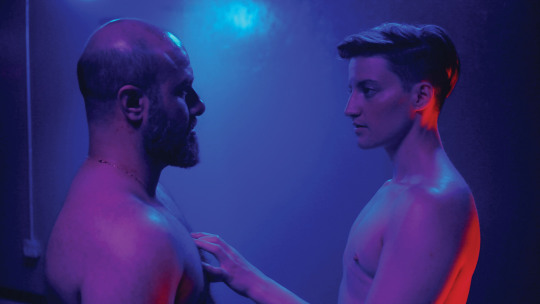
View On WordPress
#Black trans masculine#desire lines film review#desire lines review#desire lines sundance review#desire lines the queer review#gay#gay film#gay trans men#gay transmascm#gay transmasculine#James Kleinmann#lgbt#lgbtq#lgbtq film#queer#queer transmasc#queer trasn men#sundance desire lines review#The Queer Review#the queer review desire lines#trans#trans archives#trans documenetary#trans film#trans history#trans masc#trans masc gay documentary#trans masc gay film#trans masculine#transgender
1 note
·
View note
Text
Part fiction and part documentary, filmmaker Jules Rosskham has created a fascinating hybrid cinema model. It’s a jarring and bizarre mix of mediums that explores real people who deserve to have their stories told and preserved. In the film, an Iranian American trans man named Ahmad (Aden Hakimi) time-travels with the help of a fantastical bathhouse that’s been transformed into an archive of queer experience. He’s on a mission to reveal the daring sexual secrets of his past and to remember the loves and encounters that he’s left behind. It’s an erotic, trans-masc phantasmagoria, a fever dream where he encounters Kieran (Theo Germaine), an archivist of queer memories. Soon, Kieran’s own past and existence become braided into the trans history on display within the more formal documentary segments of the film. [...]
[...] The most important facet of the film comes when we are transported back to the late 1980s to witness real footage of trans activist Lou Sullivan, who himself shined a light on the existence of gay trans men when nobody else was. Sullivan was possibly the very first trans man to publically exist as a homosexual, and was responsible for a lot of education and activism surrounding his community. While the entirety of Desire Lines was fascinating to behold, it was the moments I was able to hear and learn directly from Sullivan, who died at 39 from AIDS, that I found to be the most incredible part of this unique journey.
227 notes
·
View notes
Text
BL 2023 Review
I wasn’t sure how I wanted to write about BL for this year. I was originally going to do a The Good, The Bad, and the Ugly framework for it, but that feels meaner than I actually am about it. Instead, I think I’ll just write out some sections and unpack some things I felt along the way.
I Watched Too Much Again
Last year I engaged with about 92 productions around the world. This year it was 99 (I tracked stuff I completed here). Sure I dropped 18 of them this year, but goddamn. The problem with watching as much as I did this year is that I worked full time this year and also maintained a separate hobby. I also continued my twice-weekly watch sessions with my friend Emily, so there are an additional 100-ish watch sessions in here of rewatching, plus a few other rewatches (Theory of Love and My Ride most notably).
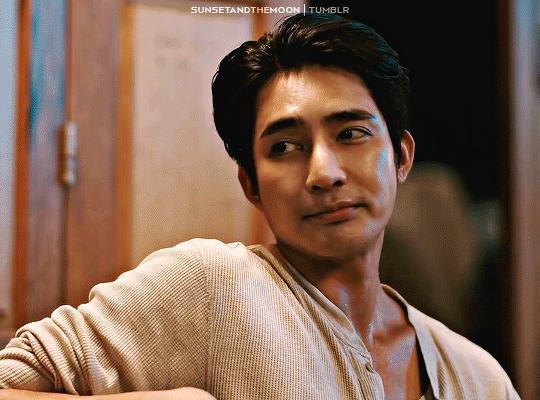
One of my struggles at this point is I’m far too familiar with the genre, and find myself feeling impatient and irritable with shows that aren’t to my taste the way I used to. Throughout the late summer and fall I found myself increasingly grumpier about the genre, and it didn’t get better until I had a holiday and basically slept a day to get some energy back. I also found myself growing apart from fans I’ve known and followed a long time. It’s been a difficult year for me as a long-time fan because my tastes, habits, and friendships in the genre have changed even if the amount I watch hasn’t really.
I Wrote a Lot This Year
I recently converted my watch tag away from my gaming internet persona to just my shortname, so all near-1000 of my Stray Thoughts posts can be found under #ben watches now. I’ve also been going back and adding #ben writes to some of the standalone pieces that I really liked. In reviewing them, the pieces I’m happiest about are my ode to Framboise from Kabe Koji Nekoyashiki-kun Desires to Be Recognized, my post begging everyone to watch La Pluie, my post about what it means to actually like queer men, my SBS ep 10 post that ended up being wrong, my post about the Lavender Scare and Be My Favorite, my Tokyo in April is… post about the breaking of the BL line,
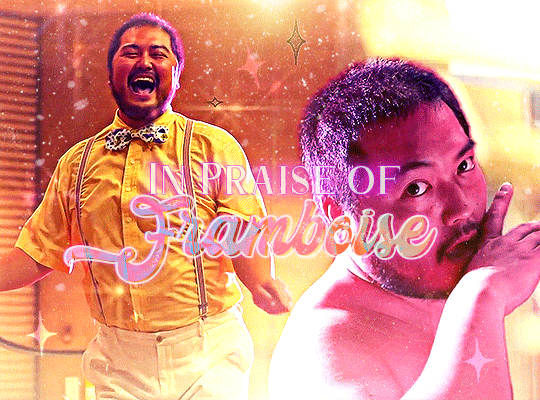
However, the two posts I am most proud of is my half-joking response about why I think tagging each other back and forth across Tumblr in our writing is so important. and The Knowing: Being Queer in BL because I had so much great conversations with folks as a result of both of these posts.
Looking back at my own blog, this is probably the most active I’ve been in my entire time on this website, so thank you to everyone who interacted with me this year, because it really is people talking to me that gets me most inspired to write things down. Big shout out to @lurkingshan who will bug me repeatedly until I blog something that I said in passing.
We Started a Podcast!
After hanging out with @shortpplfedup since Bad Buddy, she got inspired and really wanted to bring something different to the BL podcasting sphere. I had time, and liked talking with her enough, so we started @the-conversation-pod. Now we’re a full year into it and planning out future stuff. It’s been so much fun being able to get things off my soul and break poor NiNi in our recording sessions.
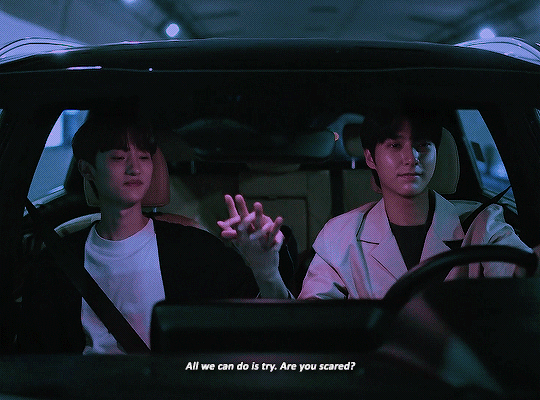
From this year, I think my favorite episodes we did were The Moonlight Chicken Episode, the Eighth Sense episode, the ITSAY Anniversary Episodes, The Wedding Plan episode, , and The Holiday Clip Show. Huge shout out to @ginnymoonbeam for anchoring the transcription process, and @lurkingshan for editing.
The VIIB Awards will begin airing soontm so look forward to that.
Favorite New Term: Business Gay Performance
Let’s be clear, Bump Up Business is not good. It is an obvious BL cash grab from OnlyOneOf that seeks to comment on the fake nature of BL while doing everything it can to trick the audience into believing that the BL pair is real.
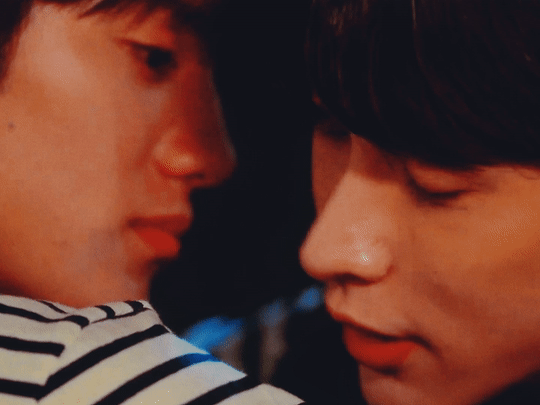
Before we got deeper into this year, I was a big fan of a certain pairing, and then their fans took it too far and it affected the way I engaged with their performances and their work. I like that we have a new term for “fanservice” that communicates that you understand that this is for work. (thanks to NiNi for this comparison) I can look at the latest behind the scenes video from Last Twilight and say that I think Sea really understands the work they’re doing, and he and Jimmy have a very relaxed and mature version of BGP without feeling like I’m feeding into shipping.
Do I think they’re dating? No. Do I like the way they fake it? Absolutely!
I can look at one of @respectthepetty posts about Yin and War having personalized, color-coded mics, and we can talk about the next level BGP between the two and both communicate that we know that this is a performance.
It actually makes the extra PR work fun for me again, because now I can just shout “BGP! BGP! BGP!” and it not feel like I’m giving myself brainrot.
Thai BL Needs to Finish Stronger Next Year
Let’s get into some of the show stuff. This year was defined for me by Thai BL starting strong with good premises and then squandering them by not focusing on the details that mattered or leaning into baseless melodrama. Time for some reads. Some of these shows were generally good, but they failed at these things:
609 Bedtime Story: The world building crumpled in the back half and both endings are flat.
A Boss and a Babe: Cher is a pro gamer who worked for a gaming company and there was no plot point about this at all, or collaboration between the two groups.
Bake Me Please: Why was a show about cake so lacking in flavor?
Be Mine SuperStar: You had a real opportunity to explore a fan and idol romance and had Punn show so little growth. I hope the footage of First’s range is helpful now that Ja is out of BL.
Be My Favorite: You redid that whole amusement park date and muddled so much of what the hell happened on that day.
Between Us: You had years to make this interesting. Why are there five pairs and why is the end of this a JC Penny catalog photoshoot?
Dangerous Romance: What the fuck happened to the Sailom we had in episode 1 and 2 before that gun incident?
Hidden Agenda: Tee, what the hell was this? Twelve weeks of this?
I Feel You Linger in the Air: You may be the most beautiful show, with some of the most impressive performances of the year, but you absolutely botched this ending. Finish the goddamn season next time.
Love in Translation: I love you, but that whole kidnapping plot was so stupid at the end.
Low Frequency: I like your OST. That's about it.
My Dear Gangster Oppa: No examination about how gaming friendships become close quickly because of the combination of anonymity and teamwork (shout out to @twig-tea for this excellent summation).
My School President: Saving your gay commentary for the final episode felt like a conservative choice. I want more from you next time.
Naughty Babe: You retconned your own characters to tell a worse story. Unforgiveable.
Never Let Me Go: You didn’t know if you wanted to be a high school BL or a mafia story. It was difficult to watch.
Only Friends: I cannot believe you did Boston like that at the end. Either give Force’s character a clear personality next time, or keep him enigmatic; half measures make him and Book look worse. Sand was absolutely embarrassing. Boeing was a waste. Ending on all of them paired like that felt so unearned.
Step By Step: You forgot to ground Jeng’s external dreams at the end, so the final two episodes are just frustrating.
I’m glad I got that off my chest. We can go into the next year now.
Korea Put in the Work This Year
I really like the efforts from the various Korean studios this year. I really hope we get a Strongberry joint next year, but I want to acknowledge that we had 18 Korean BL dramas I watched this year, and at least three of them I think are must watches: Our Dating Sim, Sing My Crush, and The Eighth Sense. Beyond that, I think Love Tractor, Unintentional Love Story, and A Breeze of Love are easy recommendations.
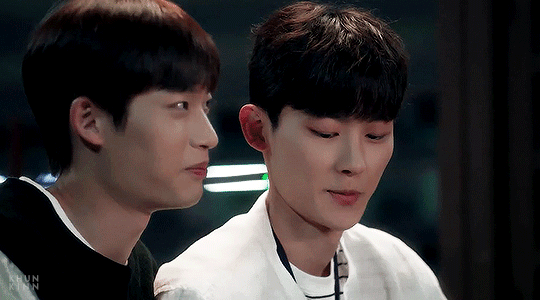
It’s really impressive how the complaint for me this year with Korean BL is not about them using their time poorly. It’s more about normal drama concerns, where I think characterization is a little weak, or a theme doesn’t land squarely. This rapid iteration from the Korean studios is really impressive to watch, and I’m excited to see what some of the recognized players do next year.
Taiwan and The Philippines Have Been Quiet for Me
I wasn’t really able to connect with much from the Philippines this year except for The Day I Loved You. I never wrote about The Day I Loved You, but this beautiful and heart wrenching show is one of my favorites from this year. I wasn’t too keen on the Oxin Films offerings of this year, and I’m still chasing down the ones from The IdeaFirst Company.
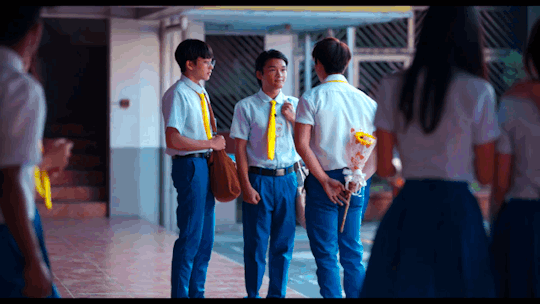
As for Taiwan, this new BL project from the end of the year just isn’t hitting. Kiseki: Dear to Me also ended up really hurting me with the way they used Wayne Song and Huang Chun Chih. I love that angry little man with the white hair, but I’m still salty about Wayne and the general mess of that show.
Japan was Busy This Year
I watched 16 new shows, a few older ones, and a few movies this year from Japan. We haven’t gotten this much from them ever. I continue to love the Drama Shower project from MBS, and my beloved What Did You Eat Yesterday? returned this year. We had pretty stellar outings with Our Dining Table, If It’s With You, and I Cannot Reach You.
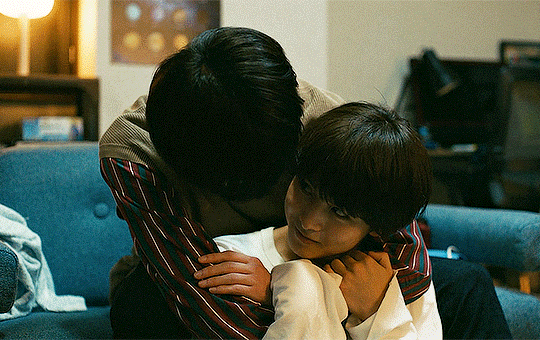
I think a third of the Japanese BL I’ve tracked on MDL actually released this year. That’s huge.
Still, I am going to side eye Minato’s Laundromat 2. You were the show that let me down the most this entire year. More than Only Friends, more than Step By Step, and even more than Kiseki. You absolutely blew it. You were telling a great story about a man with an acute case of internalized homophobia coming out of his shell and learning to love his younger partner and you blew it for stupid amnesia nonsense. I will never forgive you for this.
Where Were All the Uncles This Year?
Really, without Jim from Moonlight Chicken, and without the men from What Did You Eat Yesterday? we had an alarming dearth of older gay characters passing on knowledge and wisdom to the youngsters this year. What the hell happened?
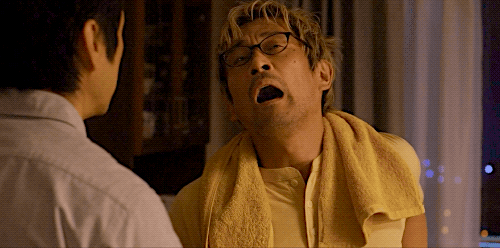
Rare Dynamics Won: Second Chance Romance and Friends to Lovers!
We had so much second chance romance this year. It’s really my favorite version of gay romance because gays don’t always have ideal settings when they’re young. We had Our Dating Sim, Individual Circumstances, Jun & Jun, The End of the World With You, Tokyo in April is…, Be My Favorite, Love Class Season 2, and A Breeze of Love. I am satisfied.

Friends to Lovers is actually so rare in romance and we have so many to choose from this year! The best examples are I Cannot Reach You and Sing My Crush, but we also have one of the pairs in Love Class Season 2.
Gay Thoughts
I had a couple of ongoing thoughts this year about queerness in BL.
First, I want to return to my post about Sing My Crush and La Pluie, and how I assert that Men Need to Be Angry Sometimes. More than giving men grace to be righteously angry or upset about things, along with letting them express it in ugly ways, I really want to get into how we engage with these shows. I will stop engaging with moralistic reads on characters in 2024. I will no longer engage with asks, reblogs, or meta gripping the fandom where we're judging the moral fiber of the character.
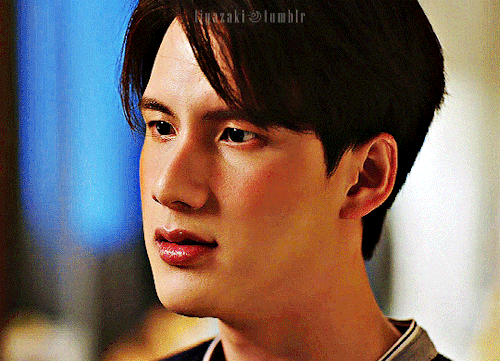
The question that really only matters for me at this point is: Is this act from the character justified from their characterization, the narrative, or genre conventions; and is it interesting? Whether or not the character is good or bad reeks of the lame arguments about good and bad representation, and I am not watching BL like I’m being graded in Sunday school.
The second thing I really want to acknowledge at the end of the year is that the gay sex is finally getting better again. I watched The Novelist this year, and we have taken so long to get back to the space that show took us on the portrayal of male-male intimacy. We are in the genre about people with dicks. It should feel like it. There should be a masculine component there that feels specific to queer intimacy.
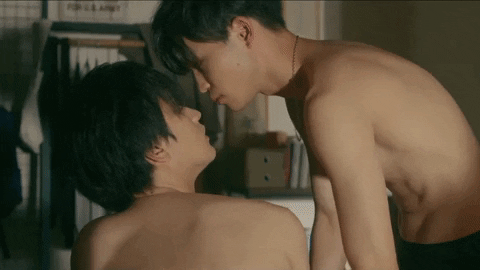
I will acknowledge 2 Cutie 2 Pie, A Boss and a Babe, Be Mine SuperStar, Bed Friend, Candy Color Paradox, For Him, I Cannot Reach You, Kiseki: Dear to Me, La Pluie, Love Class 2, Love in Translation, Love Mate, Middleman’s Love, Naughty Babe, Only Friends, The End of the World With You, Tokyo in April is…, and Wedding Plan for your contributions.
Final Thoughts
I like how broad the genre felt this year, and I enjoyed how much speculative fiction is entering into the conversation. I don’t know how I feel about there being five vampire stories in the works next year, but overall I’m glad that we’re getting more experimental concepts. I’m burnt out on the college engineering BL, and would like to see more shows about working adults.
Despite how grumpy I was for at least three months, I think this has genuinely been one of the best years we’ve ever had in the genre. I made a lot of new friends in BL this year, and I’m excited to see what comes next. Thank you all for spending some of your time with me this year and I’ll see you in the next one.
#Ben writes#best of bl 2023#bl series#thai bl#japanese bl#taiwanese bl#filipino bl#korean bl#ben watches
160 notes
·
View notes
Text
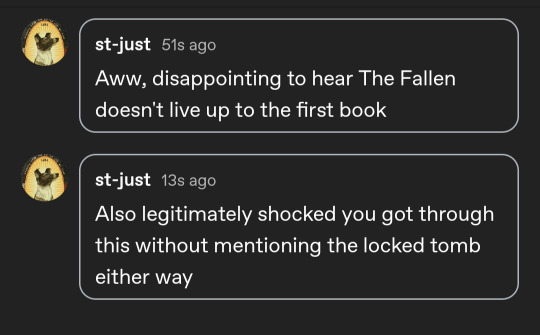
@st-just, in reference to this post.
Here's my more in-depth review of The Faithless, if you're curious.
The Locked Tomb is something of a special case of queer norm fiction. It took me a while to figure out why I loved tlt so much when I was so cold on all other queer norm fiction, but I do have an answer.
The thing about tlt is that it's queer norm in the sense that queer characters and relationships are utterly unremarkable... but it's also not queer norm because there is no norm. The worldbuilding in tlt is deliberately sparse, such that we have no idea what a normal family or relationship within the Nine Houses even looks like! We know Harrow's parents were married and had her. We know that Magnus and Abigail are married but don't have children. We know that Corona and Ianthe have parents. We know that children can be grown artificially in vats. We know that marriage for political alliance is a concept that Harrow is aware of. And as far as I can remember, that's it! The worldbuilding is a black box, and nothing that we can glimpse in it is strained by unremarkable queerness, which is a very rare thing.
The Locked Tomb also injects other elements that resonate with me as authentically queer. Probably the biggest one is that the characters, in addition to being queer, are horny and weird about it. Like, I know that sounds trite to say, but of all the wlw books I've read, I would say a plurality are pretty chaste, and most of the ones that aren't are fairly tame or understated in the level and type of horniness on display. There's a lot to be said about the overlap between the queer community and the kink community that is way beyond the scope of this post, but without even touching Harrianthe bone sex and Nona's vore thing, one of the first things we learn about Gideon is that she owns porn magazines. It is vanishingly rare for fiction to acknowledge that people have or use pornography, let alone queer characters, let alone in a value neutral way, but a lot of queer people owe some part of their self-discovery to porn, in whatever form. The books are just full of unsanitized, "impure", queer desire, and that's both resonant and uncommon.
The last thing, I think, that makes tlt stand apart from queer norm fiction, is that the queer normalization is localized. In Nona the Ninth, we see life outside the Nine Houses, and it is messy. Pyrrha gets misgendered and stereotyped. Her gender identity is misunderstood and disrespected. The polite fiction of perfect understanding and tolerance of a lot of queer norm settings falls away completely. If you want to take a particularly meta read, you could argue that since the Nine Houses are not an emergent culture but a society designed and created by John, a queer man from our time, that he acted as an author and deliberately enforced queer norm standards on them because if he was going to be God, then god dammit he was gonna have his queer utopia about it.
The locked tomb deals with queerness in its setting in a really novel way that works very well for it specifically, and I really enjoy it. You could argue whether it counts as queer norm or not, because it very much blurs the lines. Something queer about that too, yeah?
228 notes
·
View notes
Text




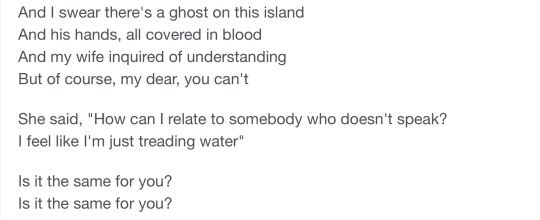

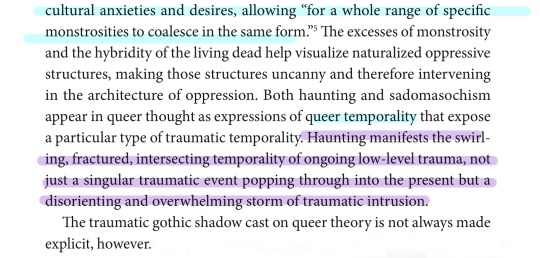
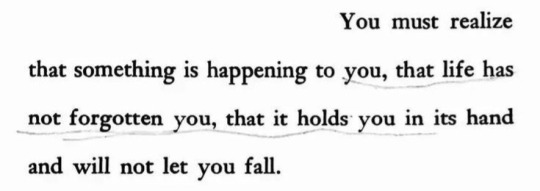
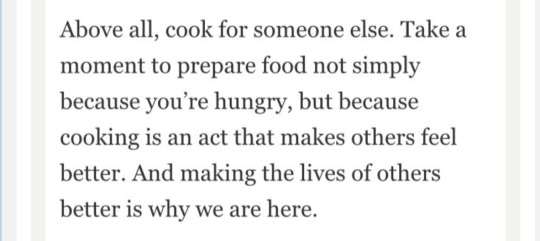

i feel like it’s potentially relevant i keep track of these all in a discord channel called nettle spiralling. family portrait of nettle nolastname
@july-19th-club / my nieces is probably the reincarnation of shirley jackson, cj hauser with notes / all about love, bell hooks / where angels fear to tread, e m forster / antichrist, the 1975 / elisabeth hewer / haunted epistemologies, laura westengard / letters to a young poet, rainer maria rilke / sam sifton / the anthropocene reviewed, john green
[Image Description: Ten pictures of text.
1: “simply cannot resist what i call the little mermaid or the tin man or the pinocchio plot, the one about a character who is either inhuman or human but outside in some way, constantly searching for whatever it is that they consider to be the quintessential proof of humanity, preoccupied by it so deeply that they fail to realise the proof is in the act and fact of the search itself”
2: “”What does it mean for the structure of your life to feel menacing? To be imprisoned within it? To feel like it might kill you?”
Haunting is an act of care, care is an act of haunting. Haunting is formed between the trauma, mothers inflict on their daughters.”
3: “We can never go back. I know that now. We can go for-ward. We can find the love our hearts long for, but not until we let go grief about the love we lost long ago, when we were little and had no voice to speak the heart’s longing.” The first three sentences are highlighted in red.”
4: “I seem fated to pass through the world without colliding with it or moving it - and I’m sure I can’t tell you whether the fate’s good or evil. I don’t die - I don’t fall in love. And if other people die or fall in love they always do it when I’m just not there.”
5: “And I swear there's a ghost on this island / And his hands, all covered in blood / And my wife inquired of understanding / But of course, my dear, you can't
She said, How can I relate to somebody who doesn't speak?/ I feel like I'm just treading water
Is it the same for you? / Is it the same for you?”
6: “I want to be eaten alive. I want / to feel wanted.”
7: “cultural anxieties and desires, allowing”for a whole range of specific monstrosities to coalesce in the same form.” The excesses of monstrosity and the hybridity of the living dead help visualize naturalized oppressive structures, making those structures uncanny and therefore intervening in the architecture of oppression. Both haunting and sadomasochism appear in queer thought as expressions of queer temporality that expose a particular type of traumatic temporality. Haunting manifests the swirl-ing, fractured, intersecting temporality of ongoing low-level trauma, not just a single event popping through into the present but a disorienting and overwhelming storm of traumatic intrusion.
The traumatic gothic shadow cast on queer theory is not always made explicit however.” The initial sentence fragment and queer temporality are highlighted in blue. The penultimate sentence is highlighted in purple.
8: “You must realise that something is happening to you, that life has not forgotten you, that it holds you in its hands and will not let you fall.”
9: “Above all, cook for someone else. Take a moment to prepare food not simply because you’re hungry, but because cooking is an act that makes others feel better. And making the lives of others better is why we are here.”
10: A photo of a page of a book, some lines are highlighted in yellow throughout. “would like that, to show it your belly. There’s something deep within me, something intensely fragile, that is terrified of turning itself to the world.
I’m scared to even write this down, because I worry that having confessed this fragility, you now know where to punch. I know that if I’m hit where I am earnest, I will never recover.
It can sometimes feel like loving the beauty that surrounds us is somehow disrespectful to the many horrors that also surround us. But mostly, I think I’m just scared that if I show the world my belly it will devour me. And so I wear the armor of cynicism, and hide behind the great walls of irony, and only glimpse beauty with my back turned to it, through the Claude glass.
But I want to be earnest, even if it’s embarrassing.”
End ID.]
#litstack#web weaving#quotes#personal#c:lensa#nettle :)#yes I am using nettle feelings to make you all read a chunk of one of my favourite papers#haunted epistemology my absolute beloved
315 notes
·
View notes
Text
Thought I’d share this review of Gender/Fucking: The Pleasures and Politics of Living in a Gendered Body, posted to Goodreads by a user named Haley:
“Wow, wow, WOW— this is a book that invites you, the reader, not only to learn but also to EXPLORE— it’s a patchwork quilt of memoirs, erotic interludes, and critical analysis, and it’s gripping and devastating at every turn. Florence Ashley, a transfem jurist and bioethicist, is a brilliant writer with a penchant for luscious prose and biting commentary. This collection is equally brilliant, introducing the concept of “academic smut” as a vehicle for telling stories of love, loss, growth, and tragedy against a backdrop of trans identity and intellectualism. As a nonbinary person, I found myself represented in living color on every page; reading this collection left me tear-stained and devastated, and yet immeasurably hopeful at the same time. It’s a storytelling format I could never have predicted enjoying, as I’m rather open about not enjoying erotica as a written genre (with the exception of fanfiction!) due to my own discomfort with first-person-POV sex— however, the erotica here DOES something. It gives a tangible example of the theories and thought-processes that Florence describes in each chapter; it gives the reader an opportunity to imagine sexual dynamics playing out not only in front of them but with them in the driver’s seat, and again— as someone whose queer activities echo some of Florence’s own, it was deeply eye-opening to see myself and my desires on paper that exposes the pleasure, shame, and possibilities that we all partake in.
In particular, I'm drawn to one phrase that Florence concludes with in their "Trespass on the Fox" essay: these are questions without answers. am i open to being loved, to being lovable? maybe. Upon reading that, I had to sit and stare blankly at the wall for a time I can't begin to measure. Not only for the raw questioning of how I exist in regards to love, but for the openness in stating that these words, and all the words in Florence's collection, do not exist to serve as definitive answers of, well, pretty much anything! I've spent the past 18 years of my life entrenched in academia, and the idea that I don't have to always answer "yes" or "no" when asked about my "take" on something isn't necessarily foreign, but it's under-represented in nonfiction works, and it was a breath of fresh air to see it so frankly discussed here.
Though I am hesitant to describe any essay in detail, as I do truly think each entry deserves to be experienced firsthand, I want to conclude my review with an analysis of "Libidinal Vertigo," one of two essays that Florence warns about in their Preface for their potentially-triggering material. It's a deeply unsettling essay for two reasons: one, it discusses famed (or, rather, infamous) TERF (trans-exclusionary radical feminists) scholars like Mary Daly in detail, and their works are ones that have caused me a lot of personal strife as well; two, it explores Florence's (and that of all transfem folx) vulnerability to the very same transphobic rhetoric that most of us wish was contained solely in now-fading academic texts. We (and I use this word here confidently, despite existing not as a transfem person as AFAB and nonbinary) are all deeply susceptible to the internalized transphobia that runs rampant across our social media threads and bathroom-sink conversations. Florence, in protest of Janice Raymond's vitriol, invites us to embrace our monstrosity... echoing a brilliant passage of poetry discussing Frankenstein many pages prior. If they cast us as monsters, without giving us a chance to recite our lines, then perhaps we should acknowledge our hatred— and use it as fuel to empower healing amongst our own.
I cannot put into words how much I recommend this collection; it deserves to be immortalized in the canon of transgender studies, and it also deserves to be passed around amongst friends and highlighted and annotated to no end, the pages themselves becoming a living museum of memory and community. Whether you are trans, cis, or beginning your own journey of self-discovery, this book is a light amongst a sea of uncertainty and darkness, and I highly encourage you to pick up a copy of your own.
Note: I receive a gifted ARC from Clash Books; as always, I was under no obligation to leave a review, and all my thoughts/ramblings are my own <3”
27 notes
·
View notes
Text
Review: Bottoms (2023)
Bottoms is a sapphic teen sex comedy about two unpopular lesbians that start a women's fight club at their high school to try and hook up with cheerleaders after a series of miscommunication and escalating lies to looks cool. Hands down one of the funniest movies I've ever seen. And one of the smartest.
It's plot is absolutely wild, but it captures normal teen emotions so honestly. It both embraces the tropes of classic teen comedies (especially of the 1980s) while subverting them entirely. Everything is a little too big and off the rails in a way things feels when you're a teenager going through all this for the first time in your life. Magnified by the systemic injustice of being a young woman in 2023. It really captures that feeling of surviving high school feeling like a life or death struggle.
All the adults are failing these kids in unique ways. So literally and metaphorically the kids are teaching themselves and they don't know what they're doing or how to stay safe or how to keep things from getting out of hand. Even when an adult is explicitly supposed to be watching over them or is gone to for advice, the kids come away only knowing not to be like them. I love how Mr. G embodies misogyny and fake allies in it for themselves. His apathy and desire to cover his ass allows this to get started. The coming of age lesson is that the girls are going to have to figure out how to save the world because the adults aren't coming to save them. There's a comradery in that.
The characters feel so complicated and alive. You could make a whole film about any one of them. All with their own hangups and ambitions. The film pokes fun at them but also sympathetically understands them. Except the football team and their supporters who very much represent toxic masculinity in a cishet patriarchal society that glamorizes violence. But with a cartoon violence energy.
They threaded some incredibly tight lines here. It faced some tough subjects head on but with so much humor. The jokes you've been waiting for someone to pull off for years.
Great film. You should watch it. Queer people continue to be the funniest filmmakers on the planet.
39 notes
·
View notes
Note
I'm very curious about any more in depth thoughts you have on It Came From The Closet! It's been on my radar and I'd been planning to check it out soon as my next read, and this is the first opinion I've seen on it that isn't part of what feels like marketing reviews almost. Is it the analysis of the horror movies and themes that feels off or the way the essays are written? I'm a huge horror fan and I've definitely seen a...few queer horror takes that felt either like reaches or just "off" to me, but it's always hard to put my finger on it
i’ve only read the first few essays so it’s entirely possible that the volume will improve from here on out (though i … haven’t gotten my hopes up), but my impression so far is that it’s a series of schlocky, surface-level analyses providing a veneer of pop talking points around “horror” and “queerness” over what are often frankly uninteresting personal essays. v little insight and v little desire to bring anything new to the table; frankly, v little interest in the films they purport to be writing on beyond shallow rhetorical vehicles for personal reflection. my patience for The Personal Essay is vvv low at the best of times, but like, i can appreciate a work from which i can glean some compelling insights and articulate a thoughtful response. and, god, none of these pieces have crossed that hurdle so far.
like, if it’s not a long string of appeals to buzzwords like “queerbaiting” and “bury your gays” or v poorly substantiated appeals to "subversion" then it's incorrectly defined “reparative reading” or one writer citing that stupid mary oliver soft animal of your body whatever line out of literally nowhere. it’s just not insightful or imaginative. at its worst it does just read like an annoying tumblr post circa 2017. carmen maria machado writes an essay on jennifer’s body as articulating something essential to her bisexuality such that efforts to talk about the way in which it marketed itself via appealing to the homophobic cultural currency of teen lesbian eroticism somehow constitutes “gatekeeping.” this is not compelling or original critical writing, people.
almost every essay seems to fall back on the same base claim: that what makes horror horrifying relies on a currency of alterity which discursively constructs the “other” and that queer people can & will identify with the “other”—the monster in the horror film—in order to make sense of themselves & overturn the hegemony that the film may well seek to affirm. cool, awesome—this is not new analysis. i would not expect this kind of thing to be churned out in a book published in 2022; we know this already. i worry that overleaning into this idea of a “reclamation” of sorts a) risks forfeiting the language we have available to us to actually talk about the sort of bigotry which can fuel these kinds of stories; how many people talk about le fanu’s carmilla as a stunning depiction of erotic lesbian vampires and lose sight of its having been a v homophobic, colonialist text in their doing so?; and b) neglects the tradition of horror within alterity; horror being made not out of a conservative ethos that we seek to critically remould into a kind of limp simulacrum of a “radical” one, but one born out of a desire to tell a story against heteronormative social imaginaries in the first place. it’s all well and good to identify with regan from the exorcist and cite your poor understanding of reparative readings (not a critical framework i subscribe to anyway, but like, at least get it right?) in doing so, but do we have to keep limiting our discourse to this back-and-forth about whether or not we can salvage obviously homophobic/misogynistic/ableist/racist stories forever? lol. i watched Hellraiser for the first time the other day and that was queer horror that could be met with on far more compelling terms than whatever all this is.
66 notes
·
View notes
Text
The Cosmic Wheel Sisterhood - A Deck Of Brilliant Cards [Review]

The Cosmic Wheel Keeps On Spinning and it shows us a game of politics, sisterhood and ideas. In this game you draw cards and gaze into the future and past to craft a brighter path forward for yourself, your sisterhood, and maybe all of existence. However, there is more pressing matters, Fortuna has been exiled for 200 years and she has 800 years more to go and she can't take it anymore so she does a forbidden spell and calls fourth a Behemoth to help set her free. Get revenge, hug some friends and get to reading the cards.
This game is presented in a visual delight with some of the best sprite work I've ever seen, it is truly a beauty to behold. That beauty stays with it's writing as well, the content warnings it has are no joke and the content is unavoidable so please do read them for your own safety but I do think they are handled well, their brief, they give you an idea of the character and they add to the story in a way I think they were needed.
The gameplay is fairly simple you read people's fortunes picking from a limited set of choices based on what card you drew for what questions, you make cards, and in the last parts of the game you are doing a political worker placement game where you try to win an election. All these elements are simple and basic enough that they would work for a mobile game. It's extremally fun and easy to play.
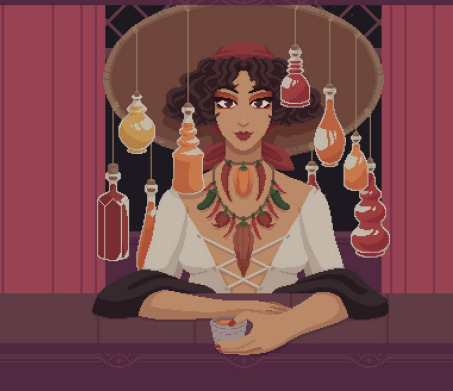
The world itself is delightful, it's the kind of thing you play and you wish is real, that you could ascend and become a space witch with your loved ones and live eternally. It gives the world real problems, flawed systems and let you shape your own opinions about it. You may not be able to fix all the problems with society and there are times where the game even outside of card readings will present you with having to choose something you might not agree with but the game lets you engage with it's world in big ways and make big decisions.
This game is pretty queer and engaged in queer reality, your character is from the 1960s and she's some flavor of queer, what that flavor is is up to you as far as I can tell, she reads to me as like Demisexual and a Lesbian but I think there is plenty of cases to be made for other sexualities. If you choose Romance as the option you want to size then you will get with a woman, the game only has women in it outside of the demon you summon all other men are off screen, mentioned to exist sometimes positively, something neutrally, sometimes negatively. The games queerness adds to the theme of Sisterhood both being queer in the relationships the women are looking for while having some women express desire in men that exist off screen. It also is queer in that you help a trans woman transition into her true self. She is definitively a woman and you will be helping her out and you can potentially have her at your side for the political campaign. The broader sense of sisterhood here and the different things relationships to womanhood and other women can mean are really strong here.
Politically this game ranges from like American Democrat to arguably anarchist positions. When setting up your policies and seeing the policies of others you'll get a range of politics to choose from but ultimately you do only have 4 choices in most sections for policy. That said policy isn't all there is to the politics of the world itself. The world is fairly nice as it is, far better than earth as it stands so the base line is good and the previously mentioned queerness is never a conflict. They live in an all women sisterhood and while people travel and there are men in other places, obviously queerness is the most common thing for witches. In fact even polyamory is totally normalized in this world and while you can't be polyamorous romance is not a focus and you stating desire in someone else does not in any negative way impact your romantic relationship that you can get into with a hot butch lesbian. Then the politics have one last layer which is the cards, what you choose from the cards readings can also show a range of politics, beliefs and more from you. Choosing the choice you think is best for you, for them or the world. These can all paint a political picture outside of the range of your political campaign although your choices are also more RNG dependent and also tied to your cards. Plus there was a non RNG point where I did have to make an argument I really did not want to make and it really did annoy me especially in retrospect when It didn't factor into the game at all. However, that was the only moment in the whole game I felt like that when it wasn't based on RNG from the cards.

Now, I did not like the ending I got the first time I played this game through, some people will find that a somber ending, not getting what you wanted or paying the price you promised will be fitting but not I. So I played the game again, I speed ran through the game knowing the future now, in a way it felt very thematic, to know all the players, all the twists, all the turns and to use that to craft myself a perfect ending for everyone, a true happy utopia no matter what it too and I did it. A very small percent of people have managed to craft a truly happy ending but I am among them! I do think if I did not have the time of will to basically just rush through the game a second time I might have walked away with a worse impression of the game having disliked my ending and knowing I wouldn't have liked the other somber options either. However, it was really satisfying to make my ending even if it required a few additional hours of gameplay in which some of it I was more on auto pilot. The game is not super long and if you do the second run right after the first you won't need to reread a lot of what is going on only the choices you make differently.

Overall, this game is really a delight and something special, I think anyone who wouldn't struggle with the themes in the content warnings will really gain something from this game and for me it was a 10 hour little adventure on my first run, with a lot of that being taking time to think between choices because every choice felt like it mattered even if I knew the choice maybe wouldn't ever come up in game the people felt so real I wanted the best possible futures for them. This game is really special and has such fantast design and visuals that it is probably worth buying just to stare at and then actually playing it is another even better experience. Check out this game!
#the cosmic wheel sisterhood#Cosmic Wheel#Fortuna#Queer Games#Sapphic Games#Lesbian Games#Lesbian#Sapphic#Indie Game#Indie Game Review#Game Review#Review
31 notes
·
View notes
Text
Femme 2023 is described as a queer erotic thriller, a violent sexy revenge story. It's rated 18 in the UK and absolutely deserves the age rating for sex, violence, violent sex and plenty of blurry lines between. Definitely look up doesthedogdie or unconsenting media first.
The problem with comparing it to the 90s erotic thrillers like Fatal Attraction or Basic Instinct is you don't know if the reviewer's going from the mainstream understanding of those films or the queer or feminist reading of those messy relationships, those complex women.
[ side note: the string of sex scenes was a LOT even by eurotrash/netflix-cut-to-thrusting standards, I mean that in a "Dude, that's an awful lot of thrills mistaken for exhilaration without realizing this might not be great" way. But it had been a while since i've seen an erotic thriller and that framing might be par for the course. I'm not watching 50 Shades to compare any time soon.
Then again, there are an awful lot of straight movies/shows with lots of banging and not much crackle. Especially for me: if there's no character development in an intimate scene it's really obvious to us aces. ]
If we are taking those women as far more interesting than simple villains, if we are interested in revenge as a motivation and not necessarily a resolution, then this film fits the genre. It's quite the addition.
-------------------
Let's just say that for me, this film wasn't about two protags, it was about one man's journey to reclaim his sense of self and that path was as messy and uncontrollable and hard to understand as real life often gets after a traumatic event.
Sometimes the beginning of healing is as much about reclaiming the narrative on a social level and on a personal level as it is about reclaiming your own self from your internal multiverse of 'what if's and 'if only's.
Jules tries on many personas and desires for size, fumbles the classic hollywood revenge plots, but the open ending is very much The End... and also the beginning of Jules, who now knows who he is and what he wants.
----------------------
Absolute white-knuckle ride of a film, disturbing and relatable, great examination of the performances of masculinity and how men relate to other men. I really appreciate that the film didn't try to 'both side' it and gave us some layering to the characters.
Nathan Stewart-Jarrett is electrifying and if you don't know his work that well, assume Jules/Aphrodite is in his late 20s.
--------------
Further reading: erotic thrillers the genre
#saf#movie reviews#femme film#femme 2023#Nathan Stewart-Jarrett#george mackay#his acting was fine - the chemistry/synergy was good - I just felt he was not the main focus- not cat and mouse but man vs foil
9 notes
·
View notes
Text
The Teras Trials || Lucien Burr
★★★★☆½
TW: HOMOPHOBIA (+ USE OF SLURS), SUBSTANCE USE, ABUSE, CATHOLICISM (+ SACRILEGE), BODY HORROR, BODY DYSMORPHIA, GORE + VIOLENCE, DEATH (GRAPHIC), SUICIDE (GRAPHIC), EXPLICIT SEX
This book is pretty much just a misery fest from start to finish. Things go from bad to worse to somehow worse but instead of resolving things or overcoming them they just... are bad.
Okay, all jokes aside (the prev is a quote from a 1 star review), this book is phenomenal. It follows Cassius Jones through the admission trials he needs to pass in order to enter the University in London and keep his family safe within the walls of the city.
I think it's safe to say that this is how I feel about Cassius Jones:

God, it's so hard to encapsulate everything about this book into words. This book changed me. Legitimately.
I guess before I start rambling, let's talk about why it's getting a 4.5 star and not a 5 start if I love it so much. That's simple: I felt that the book could go through a bit more editing (I found quite a few typos though the text) and I fucking despise Latin and I despise that this book makes me want to like Latin.
Okay, all that aside, time to ramble about what I love about this book!
This is an incredibly dark and bleak book and it does not shy away from that. It does not try to hide that behind a shiny marble veneer of myth. It is also unapologetically queer and I love that with every fiber of my being. Cassius is queer, and i mean that in the very American way (despite the book and I think author being British). Cassius is not only gay, he is queer and he is proud of that fact and nothing stands in the way of him and his inherent queerness.
There is very little hope in this book, it takes a mirror to the monstrosity lying just below the surface of the reader and forces you to confront that. Forces you to acknowledge that if you were in the same situation you would have done the same.
There is a lot of finding beauty in the monstrous here, only the monstrous is humanity. There is a lot of beauty and a lot of horror shown through people in this book and it enraptured me, held me at the edge of me seat the entire time I was reading.
I was crying at multiple times in this book because of the way that monstrosity and beauty is shown. One of the times that really got me (twitter and Rafiq can attest to this) was the line:
God, is it such a sin to wish to be loved?
IN THE MIDDLE OF A SEX SCENE. I was weeping while Cassius was getting his back blown out and I am a better person for it.
Actually, since I brought out a quote, lemme tell you some other ones that got me:
You cannot escape it by wealth or war. No fort will keep it out, no ships outrun it.
I feel the brunt of my grief at that moment. I am my father's queer son. I am not the one he wanted.
I fear being seen; I fear being known.
The admission itself makes us co-conspirators, harbourers of queer desires in a queer little world.
For there is no escape from miasma, no hiding from the gods, no avoiding the judgement that is deserved.
I think my soul is a whore;
"Are you a Godly man?" "For you, I could be."
I also particularly love the conversations in Latin. I can't say too much on them without spoiling it so please skip over this if you don't want potential spoilers, but:
Horresco olfaciens tuum putridam odorem, qui sicut sanginem alterium putet (I shudder to smell your putrid odor, which stinks like the blood of another)
Vivo ut te concelebram et prosequar, quod mihi voluptatem dat (I live to haunt and hound you)
Amore et melle et felle es fecundissimus (You are most prolific in love and pleasant things and poison)
and of course, a Latin quote that I literally have tattooed on my body:
Flectere si nequeo Superos, Acheronta movebo (If I cannot move the Heavens, then I will raise Hell)
And if I can get a little nerdy over here (I'm gonna), the book mentions at one point the Homeric Hymn to Apollo! I know those hymns, they're something I did special research into last year! Specifically here he references Hymn 3, the Pythian Hymn to Apollon, lines 356-374:
ὃς τῇ γ᾽ ἀντιάσειε, φέρεσκέ μιν αἴσιμον ἦμαρ,
πρίν γέ οἱ ἰὸν ἐφῆκε ἄναξ ἑκάεργος Ἀπόλλων
καρτερόν: ἣ δ᾽ ὀδύνῃσιν ἐρεχθομένη χαλεπῇσι
κεῖτο μέγ᾽ ἀσθμαίνουσα κυλινδομένη κατὰ χῶρον.
θεσπεσίη δ᾽ ἐνοπὴ γένετ᾽ ἄσπετος: ἣ δὲ καθ᾽ ὕλην
πυκνὰ μάλ᾽ ἔνθα καὶ ἔνθα ἑλίσσετο, λεῖπε δὲ θυμὸν
φοινὸν ἀποπνείουσ᾽: ὃ δ᾽ ἐπηύξατο Φοῖβος Ἀπόλλων:
ἐνταυθοῖ νῦν πύθευ ἐπὶ χθονὶ βωτιανείρῃ:
οὐδὲ σύ γε ζώουσα κακὸν δήλημα βροτοῖσιν
ἔσσεαι, οἳ γαίης πολυφόρβου καρπὸν ἔδοντες
ἐνθάδ᾽ ἀγινήσουσι τεληέσσας ἑκατόμβας:
οὐδέ τί τοι θάνατόν γε δυσηλεγέ᾽ οὔτε Τυφωεὺς
ἀρκέσει οὔτε Χίμαιρα δυσώνυμος, ἀλλά σέ γ᾽ αὐτοῦ
πύσει Γαῖα μέλαινα καὶ ἠλέκτωρ Ὑπερίων.
ὣς φάτ᾽ ἐπευχόμενος: τὴν δὲ σκότος ὄσσε κάλυψε.
τὴν δ᾽ αὐτοῦ κατέπυσ᾽ ἱερὸν μένος Ἠελίοιο,
ἐξ οὗ νῦν Πυθὼ κικλήσκεται: οἳ δὲ ἄνακτα
Πύθιον ἀγκαλέουσιν ἐπώνυμον, οὕνεκα κεῖθι
αὐτοῦ πῦσε πέλωρ μένος ὀξέος Ἠελίοιο.
Tanslated by Hugh G. Evelyn-White as:
Whosoever met the dragoness, the day of doom would sweep him away, until the lord Apollo, who deals death from afar, shot a strong arrow at her. Then she, rent with bitter pangs, lay drawing great gasps for breath and rolling about that place. An awful noise swelled up unspeakable as she writhed continually this way and that amid the wood: and so she left her life, breathing it forth in blood. Then Phoebus Apollo boasted over her:
“Now rot here upon the soil that feeds man' You at least shall live no more to be a fell bane to men who eat the fruit of the all-nourishing earth, and who will bring hither perfect hecatombs. Against cruel death neither Typhoeus shall avail you nor ill-famed Chimera, but here shall the Earth and shining Hyperion make you rot.”
Thus said Phoebus, exulting over her: and darkness covered her eyes. And the holy strength of Helios made her rot away there; wherefore the place is now called Pytho, and men call the lord Apollo by another name, Pythian; because on that spot the power of piercing Helios made the monster rot away.
This review is getting kind of out of hand at this point, I just don't know if I can whittle down my thoughts into just one post about it. This book has changed me. This book is everything I never knew I needed, it healed a small part of my soul that I had thought was untouchable. I am fully considering my relationship with religion and how that can mesh with the very things that drove me from my faith because of this book. It is beautiful and I highly recommend people read it (while being mindful of the content warnings, of course)
#I'm literally shell shocked#I have a lot to think about in regards to how I view the world and my ex-relationship with Catholicism#It's going on the recommendation shelf for fucking sure#andi reads#book reviews#booklr#bookblr#lgbt books#queer books#queer book directory#Lucien Burr#The Teras Trial#also people need to get on this book so I can peruse fanart and fanfic
7 notes
·
View notes
Note
Hi, it's me again (the anon that asked for brain-rotting books) to tell you that I have finished These Violent Delights (or it finished me because that ending!! and the perfect final line!) I really enjoyed the book and my reading experience was very interesting because I noted right at the beginning that I relate to Paul in some ways and then he got increasingly more fucked up as the story went on and I just stood on the side lines rethinking things. Anyways I would love to hear your thoughts on the book, what stuck out to you, what did you annotate, why do you love it, I want to hear all of it💞
so idk if you follow me on goodreads and read my short review over there, but i think the reason why it's so brain-rotting to me is that it evokes such ambivalent feelings. i sympathise with the characters and their circumstance but at the same time i am appalled by a lot of their behaviour; i know that the love is there that gives paul and julien some much needed comfort, but so is the obsession that overtakes tenderness; i see that they are both victims of their (socio-economic, cultural, etc.) environment as much as they are perpetrators in their own rights. i love it when a piece of fiction uses such ambivalence to build tension. it evokes strong emotional reactions because you're feelings are pulled into every possible direction so that you end up experiencing a plethora of emotions while the story progresses. i think the fact that we're meant to initially sympathise with paul adds to that. it makes you feel indirectly complicit because you identified with him before everything derailed and it makes you question yourself for having that sympathy...
what probably fascinated me the most was the theme of violence that's at the heart of this story. it doesn't only depict various forms of violence (from social, emotional, physical to psychological), but also how these different forms of violence create, feed, reinforce, and perpetuate each other... they're different iterations of the same thing. and what really stuck out to me is how the violence in this book, in which ever form, is far more often an reaction than an action. in a way the sources of violence shapes and shifts and spreads to take several forms, but it's always the same violence that travels from vessel to vessel—whether that vessel be corporal or institutional or societal—and ultimately sustains a cycle of violence that fuels itself... like. god it's so hard to put in words but. the societal violence against marginalized groups such as queer people ignites in individuals a violence against individual queer people which can also take on the form of internalised homophobia and self-hatred as well as intimate partner violence or abuse (physical, psychological, emotional), which can be so destructive to the psyche that it might feed individuals' desire to pass along this violence and that ends up breeding an overall cultural atmosphere of fear that makes people afraid of everything and everyone they perceive as ‘other’ which in turn results in violence against marginalized groups such as queer people & the cycle begins anew... it's like an ouroboros of violence that devours itself and is reborn again just to devour itself again and again and again. a violent destruction. for me, this pattern is so clearly recognisable in the story of paul and julian and their relationship!! they’re being consumed by it in the worst way possible. and a lot of that has to do with existing as a queer person in a queerphobic world. (for me that's an undercurrent to everything in this book).
i think their obsession with each other plays into the themes of violence and queerness (and the space in which they intersect) as well. because what is obsession if not a love distorted by violence? how can you love someone tenderly when you’ve been told and taught that the love you feel is wrong and disgusting and abnormal? when all you’ve known is a form of love that has violence stitched into its very fabric? and so the love is tainted by violence and becomes obsession… because it seems like this is the only way you can keep it. because you were made to believe that that’s what you deserve because it’s probably all you’re ever gonna get. that people like you will ever gonna get.
there’s also an element of violence as a tool to reclaim agency and control. which of course backfires catastrophically. everything spirals until they lose control of themselves and their relationship. everything crumbles, their senses of identity, their trust, their companionship, their futures, their lives….. and the most telling thing is neither of them feels in control, ever, but they believe the other person to be in control and have the "upper hand" and hold all the power in their relationship. yet, they're both clearly manipulating each other to have their needs fulfilled. they both crave that all-consuming, unconditional love, but they have a hard time accepting it because they cannot even accept themselves. together, paul's self-hatred and julian's insecurities act as an antagonising force that leads them to bring out the worst in each other. because they have this twisted relationship with love (and being loved) due to their homophobic and otherwise toxic environment, they make a performance and a game out of their feelings because they have no healthy way to express their deep & intense love and devotion without transforming it into something twisted and destructive in the process. and that’s no coincidence. much like queerness, crime exists outside of what society deems acceptable or normal (in that historical period). more precisely, queerness and criminality both operate in the paradigm of social deviance. it’s like they keep turning to “violent acts” to express their feelings for each other because that’s the paradigm they are familiar with and the only paradigm in which they can act out their relationship in public and in private.
and the tragedy of it all is that it didn’t have to end this way but it was always going to end this way because their needs were too similar and neither of them could break out of their own cycle. they enabled each other and took from each other until they imploded. ((that's basically what the last line implies, in my opinion. that, at least how julian sees it, they never stood a chance and were always going to end up in flames.))
BUT THE LOVE WAS ALWAYS THERE. EVEN WHEN IT WASN’T ENOUGH. EVEN WHEN THEY WERE DOOMED FROM THE START. THE LOVE WAS THERE. and that’s something that just makes me insane.
also, there are some themes of identity formation (especially of marginalised identities) and performance that really, really fascinated me. and ofc the theme of performance kind of blended into the idea of being the narrator of your own life story and how you adjust and change the stories you tell yourself and others. ((with that in mind, the last line, or even juilan's last gesture, can also be read as a revisionary interpretation of their relationship. an statement that adjusts to the knowledge of hindsight but doesn't necessarily represent the truth of what they could have been.)) i could go on but this ask got out of hand already soooo, i am just gonna stop here.
as for what i annotated: i included some pic of a couple of annotations under the cut, so you can get an impression.
i know my handwriting is abysmal. it’s even worse when i have to keep it small so it can fit in the margins.
this is just to give you an idea of how i approached this text. it’s not super elaborate or thought-out because i read this for fun, but i still tried to capture some of my ideas and the themes i could find for myself in the text.



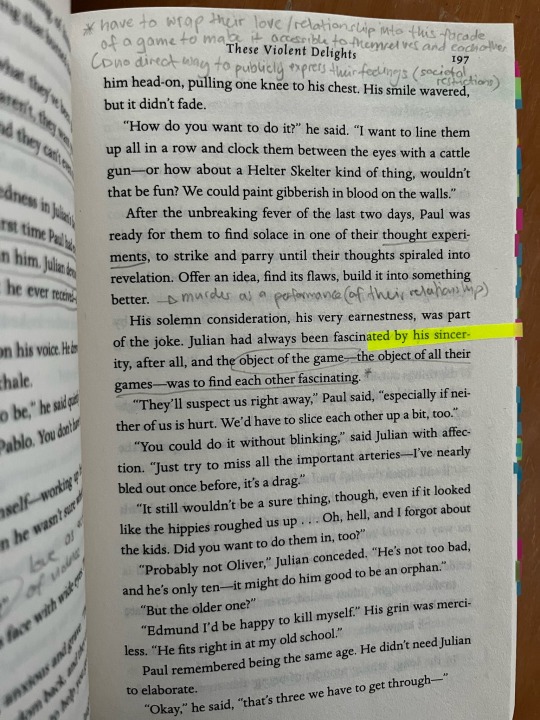
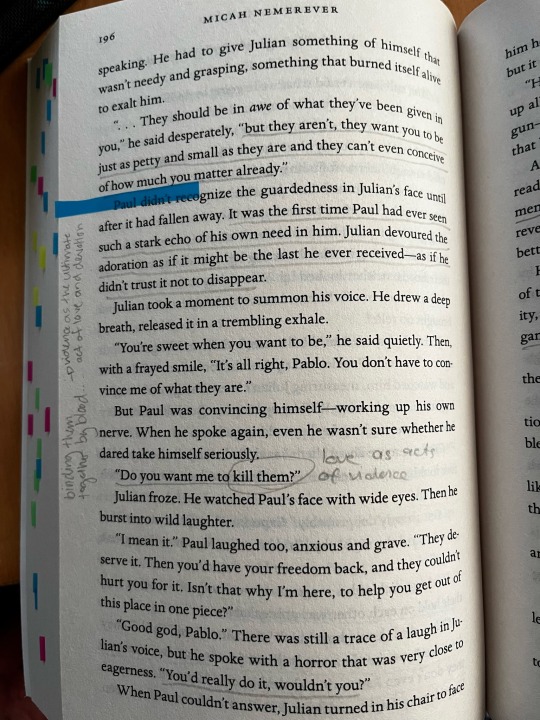
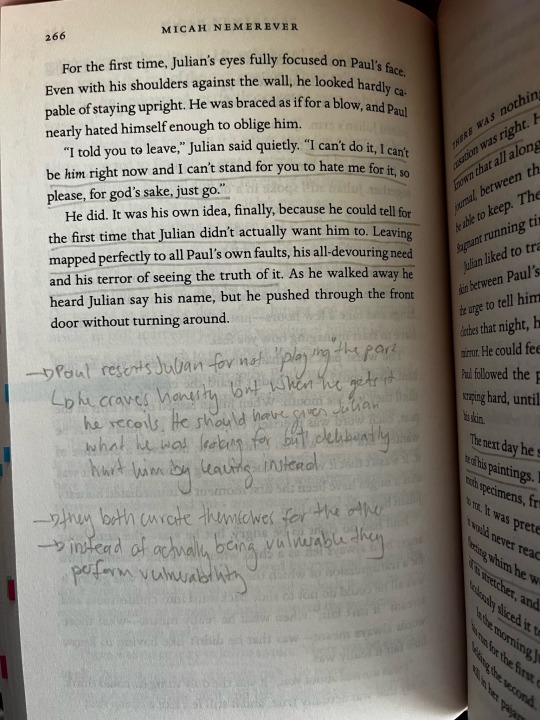
#i don’t even know what to say about this word vomit soup.#this book just really got to me idk#would looooove to hear some of your thoughts!!!#have a lovely day <3#anon#answer#mish talks books
7 notes
·
View notes
Text
'I want to be Andrew Scott’s mother. By ‘Andrew Scott’ I mean the award-winning Irish actor who played the hot priest in Phoebe Waller-Bridge’s Fleabag. By ‘mother’ I mean mother, although Scott has a perfectly good mother already (Nora, a former art teacher). By ‘want’ I mean I desire to be Scott’s mother because in this mad pandemical world the line between the feasible and the fantastical has dissolved. Ordinary pleasures of a year ago – dinner with friends; going to a concert; cuddling a grandchild – have become impossible dreams. So why not dream the impossible?
I’ve never met Andrew Scott. I think he’s a terrific actor: I loved him in Fleabag and everything else I’ve seen him in. In September he gave an in-camera performance at the Old Vic of Three Kings, a one-man play written for him by his former partner, Stephen Beresford. The play was scheduled for July 31st but a few days before I got an email saying it was delayed by Scott’s admission to hospital for ‘minor surgery’. No details, except the issue was ‘not serious or COVID-related’. In early August I received another email saying Scott was still not well enough to perform.
The weeks passed and I became anxious. My younger stepson works at the Globe; one of his closest friends is a top director. His husband is a novelist who has written for the stage. Their world is full of thesps: could they find out what was wrong? No. I fretted more. I asked some friends connected to the London theatre world. No joy there either.
In early September Scott performed Three Kings, to rave reviews. I searched his face, was he really alright? By now it’s fair to say that I was Scott-obsessed. I viewed online interviews, checked out his personal history, re-watched him as the hot priest. Adorable.
I’m not given to infatuation with performers; Elvis in G.I. Blues was the last. But I know infatuation when I feel it. This was something different. It took me time to name it. It was mothering-hunger.
I’m not a mother. But I’m rich in stepsons, nieces and nephews, godsons and goddaughters, and now two grand-godchildren, born during the pandemic. My wife has four living siblings, with dozens of children and grandchildren between them. My COVID world is full of next-generation family.
But I’ve become greedy. I want to add Scott to the mix, I want him as my boy (he’s 44, I’m 70). My family will love him, and he’ll fit in well. Thespianism? We’ve got that covered. Queer? Yep, we’re good there. Irish? My older stepson teaches philosophy in Galway. Celebrity? One of my brothers-in-law is a famous haircutter; in recent interviews Scott reminds me of him, the same well-rehearsed casual charm, the open shirt, the finger-tossed hair. Another brother-in-law is a leading stunt director; for all I know Scott may have worked with him. So he will be right at home with us.
So why not? Desire is never reality-bound. And when desire confronts disease and death it can blaze up, reaching out to life, insisting on it, demanding more of it. I want Scott because he is more of what I already have. But my son Scott also represents what I will never have – a son of my own. Not once, in all my decades of childlessness, have I hungered for motherhood as I do now, to love a life born from me, now that death is everywhere around me.
Globally COVID-19 has claimed two million lives and rising. The UK’s death rate is one of the highest in the world. One friend has died from it, another has been severely disabled. People who lose loved ones to other diseases cannot come together to mourn them. My wife lost a brother to oesophageal cancer during the first lockdown. The same disease killed a close friend of mine in early December. He lived in Toronto and his partner is my oldest friend. I should be there with her now. What hellish fate has stuck me here in London while my dear friend mourns far away? A misery of separation that I’m sharing with thousands of others across the globe. My widowed friend has two sons who cannot put their arms around her. My stepsons and I cannot hug; we might kill each other. Love and death in close embrace: an eternal theme of literature, art, drama – now made a quotidian reality.
Life revolts. Fleabag shows a young woman seesawing between sexual encounters in the wake of her mother’s death and the suicide of her closest female friend. Finally she falls in love with a Catholic priest (Scott) who chooses God over her. Death has sent her careening toward the impossible. At one point, to cover for her sister’s miscarriage in the middle of a fraught family outing, Fleabag pretends that she’s miscarried. For her, there never was a baby. But it’s the priest’s ‘beautiful neck’ that she finds irresistible. Scott does indeed have a good neck, but who cannot find a baby’s neck irresistible?
Passionate sex after funerals is a well-known phenomenon. Female sexual desire is said to have increased during the pandemic. But eros takes many forms. Child-yearning, as Lucy-Hughes Hallett labels it in Peculiar Ground (2017), can be as exigent as lust. Will there be a baby-boom in the wake of COVID? Not for me; and anyway it’s not baby-mothering I want but a gorgeous actor-son who exudes playful vitality.
In interviews Scott repeatedly describes acting as playful. He loves Picasso’s famous remark that ‘It took me my whole life to paint like a child’. I don’t know if Scott has ever read the psychoanalyst Donald Winnicott, but for Winnicott play is the life-force. Play, in children and adults, is where dreams are enacted, where fantasy and desire find creative expression. In play, people become themselves, for good or ill, and this is exciting, joyful, dangerous. When Scott played Hamlet in 2017, he surprised audiences by showing the young prince as full of fun. Why this portrayal?
If you don’t understand that Hamlet had a great joy for life, if you think that for the length of time that he was on the earth he was always depressed, well the release from life isn’t really that tragic…[but] If you think it was somebody who was full of life, and engagement, and fun, that has now just been totally sucker-punched by grief and doesn’t want to be alive anymore, I think that’s much more telling, and much more of a consuming story. (Evening Standard, 26.11.19)
Sucker-punched by grief…an image for our times. So how do we go on playing in the face of disease and death, and fear of death? We reach out for what we have; we dream of what we want. Scott’s emergency surgery, back in July, triggered a new dream in me. Anxious for him, I clutched fearfully at what I already have – the family and friends I love – and conjured up an ideal supplement: a fantasy-son, fully recovered, to accompany me through this dark time to a play-filled life beyond.'
#Andrew Scott#Hot Priest#Fleabag#Phoebe Waller-Bridge#Hamlet#Three Kings#The Old Vic#Stephen Beresford#Elvis
2 notes
·
View notes
Text
You know, those that complain about The Sandman being “TOO GEEEAAAAYYYY” (beyond being complete idiots) probably watched the full series in a row, in a binge-watching session. And binge-watching is a very good way to literally get a screwed up or bizarre memory/feeling/perception of a show.
Because, when you actually list all the “queer” characters in the season, you get quite a small number compared to the vast story.
I mean... One gay couple, a bisexual exorcist, a (secondary) gay cook, a genderless angel and one half of a lesbian couple for part 1. A gay drag-queen, a genderfluid embodiment of desire, a gay nightmare/serial killer, and one tertiary gay roomate with less than ten lines for part 2.
Nine in total. Nine characters, three of which are secondary/tertiary characters. Over how many characters in total?
And yet, what did this reviewer said... Oh yes “EVERYONE IS GAY - EVEN THE TREES ARE GAY”. (A statement which will become quite funny when the TV show reaches the part of the comic with talking tree and sentient flowers)
When someone does watch calmly the show, and then look up at the crazy homophobic/queerphobic backlash... The conclusion is quite simple. These people are not actually shocked at seeing “a lot” of gay and queer characters. What they do feel but can’t translate quite well is that they don’t like seeing queerness both normalized and given as much screentime as hetero stuff.
[I am not even talking about all the fake fans that claim that the show “invented” gay characters, when in truth most of these characters were already here in the comics back in the late 80s and early 90s]
#i probably forgot some queer characters but hey#sandman is very big already despite being just one season#two whole volumes of comic book come on#sandman#the sandman#television series#television show#queer
53 notes
·
View notes
Text
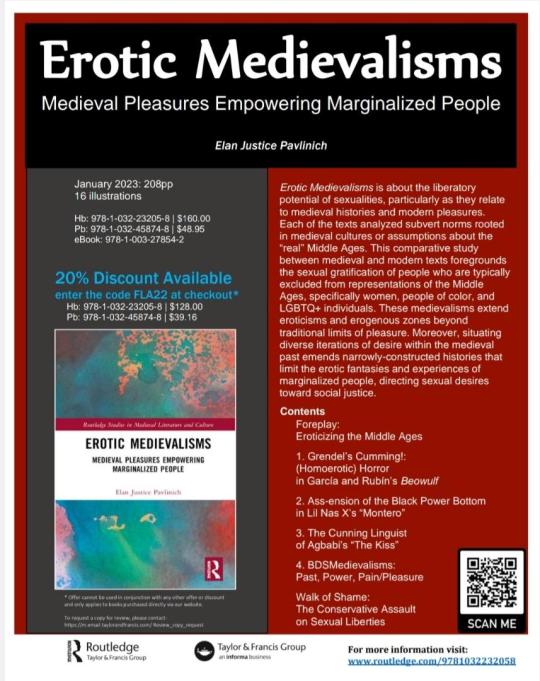
Erotic Medievalisms: Medieval Pleasures Empowering Marginalized People. By Elan Justice Pavlinich. Routledge, 2023.
Rating: 3.5/5 stars
Genre: literary criticism
Part of a Series? No
Summary: Erotic Medievalisms is about the liberatory potential of sexualities, particularly as they relate to medieval histories and modern pleasures. Each of the texts analyzed within subvert norms rooted in medieval cultures or assumptions about the "real" Middle Ages, constructing queer histories that blur the lines between fantasy and authenticity. These medievalisms extend eroticisms and erogenous zones beyond normative limits of pleasure. Moreover, situating these diverse iterations of desire within the medieval past emends narrowly-constructed histories that limit the erotic fantasies and experiences of marginalized people.
***Full review below.***
Since this book is nonfiction, my review will be organized a little differently than usual.
Full disclosure: The author is a personal friend of mine, and I provided initial feedback/comments on the introduction and conclusion of this book (though not the chapters). So my review will inherently contain some bias.
The main argument of this book is that non-normative sex acts in medieval-inspired pop culture allow for the radical inclusion of queer and BIPOC people in a cultural/historical narrative from which they are typically excluded. Pavlinich looks at four main pieces of medievalism: Santiago Garcia and David Rubin's Beowulf, Lil Nas X's "Montero (Call Me By Your Name)," Patience Agbabi's "The Kiss," and medieval-inspired aesthetics and devices in contemporary BDSM. Each chapter compares the contemporary work to a medieval counterpart and is supported by an extensive bibliography of critical theorists and literary scholarship.
Pavlinich's book is at its strongest when performing "close reading." I was extremely impressed by the insights Pavlinich offered when showing the reader little details about the text (or video or what have you) that I might have otherwise overlooked. Some of these reading are also incredibly clever; I would have never thought, for example, to make a linguistic comparison between the Old English com and the modern English cum, much less dissect how bodily fluids function the same way in the graphic novel as the dread of Grendel's arrival in the medieval poem.
That being said, I do think Pavlinich's voice gets buried under the secondary scholarship. Pavlinich cites a lot of sources, and while some of them are vital for making sure a point is convincing and well-founded, I almost get the impression that the author was counting on established scholarship to do much of the heavy lifting. At multiple points in the book, Pavlinich would make a good observation, but instead of exploring the implications further, he would back off and zoom out to show what other people have said about a similar topic. In general, I think I would have much rather liked to see Pavlinich keep the secondary sources contained and spend more time elevating his own voice. That way, the secondary sources wouldn't just be mapped onto the primary texts, but Pavlinich could show how each text "speaks back" to theory (in other words, Pavlinich's voice would be elevated by showing how his close readings may be explained by theory, but also how theory can be changed by his close readings).
I also think there are a couple areas of the book that could use more close reading to help sell a point. For example, in the chapter on "Montero," Pavlinich claims that the final act of the music video depicts Lil Nas X as a harrower of hell, a queer Black savior performing an imitatio christi. Personally, I don't think I was convinced with this argument because the chapter simply asserts it to be true and doesn't make a case using the visuals of the video. How is LNX a savior and not rejecting salvation (by becoming the king of hell himself - the archtempter), especially when salvation is predicated on whiteness and straightness (as Pavlinich establishes elsewhere in the chapter)? How do we know LNX isn't reveling in damnation? A few other spots in the book are like that, which surprised me because when Pavlinich does perform close reading, his insights are good. I just wish that strength had been deployed more often.
In short, this book is a good intro to interrogating the medievalism of pop culture artifacts that are understudied by institutional scholarship. While I do think Pavlinich can elevate his own voice further, I would love to see future work from him and see what other insights he can bring by applying queer theory to medievalism.
11 notes
·
View notes
Photo

Rating: 2/5
Book Blurb: Two destined rivals fall desperately in love—but the fate of medieval Europe hangs in the balance.
“I will always want you. Enemy or ally, I always shall.”
Twelfth-century Europe. Newly crowned King Philip of France is determined to restore his nation to its former empire and bring glory to his name. But when his greatest enemy, King Henry of England, threatens to end his reign before it can even begin, Philip is forced to make a precarious alliance with Henry’s volatile son—risking both his throne, and his heart.
Richard, Duke of Aquitaine, never thought he would be king. But when an unexpected tragedy makes him heir to England’s royal seat, he finally has an opportunity to overthrow the father he despises. At first, Philip is a useful tool in his quest for vengeance . . . until passion and politics collide, and Richard begins to question whether the crown is worth the cost.
When Philip and Richard find themselves staring down an impending war, they must choose between their desire for each other and their grand ambitions. Will their love prevail if it calls to them from across the battlefield? Teeming with royal intrigue and betrayal, this epic romance reimagines two real-life kings ensnared by an impossible choice: Follow their hearts, or earn their place in history.
Review:
Two real historical figures, a take on their relationship, and the line between duty and love. In the 12th century Europe, newly crowned king Philip of France wants to restore his nation to its former empire and bring glory to is name but then he meets his greatest enemy, King Henry of England who threatens to end his reign... Philip needs to make alliances... and the best option would be Henry’s son who dislikes his own father. Richard, Duke of Quitaine wants nothing more than to overthrow his father whom he despises, and get his mother back from her imprisonment... yet when both Richard and Philip meet, sparks fly and soon passion and politics collide. Both of them have duties they have to deal with, courts and politics they have to navigate, but the heart want what it wants, and they have to ask if they are willing to risk their place in history for each other. The story was difficult for me to get through, I do love a historical reimagining and take, but this one just kind of never really got my attention or held it, the book blurb got me interested but when I actually started reading the story I found that it was hard to get into. The romance was okay but it never truly captured my attention the way others have and the the politics were heavy, but that is to be expected. Maybe I’m just not in the right mood or the right person to read it right now but it unfortunately did not work for me despite how much I wanted it to. Nevertheless, give it a go if you are into queer historical stories with politics and romance.
*Thanks Netgalley and Random House Publishing Group - Ballantine, Dell for sending me an arc in exchange for an honest review*
10 notes
·
View notes